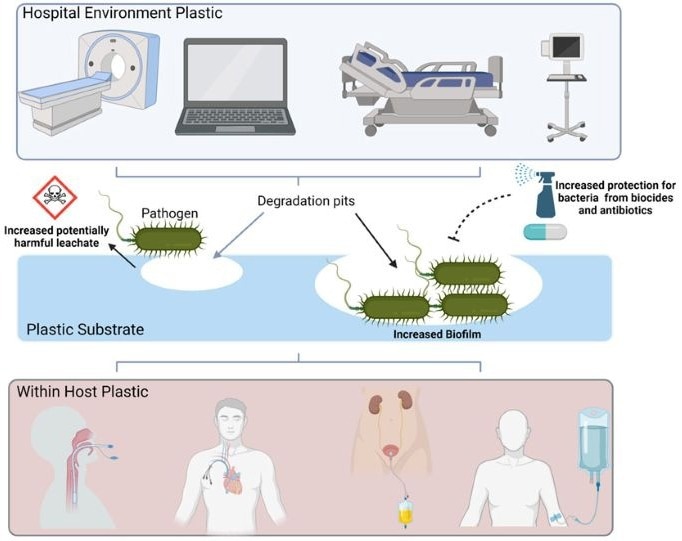Pathogen shown to break down plastic used in sutures, stents, wound dressings and implants – raising new questions over device safety and hospital infections.

Image Credit: Brunel University of London
A dangerous hospital superbug is found to digest plastic – specifically the kind used in some sutures, stents and implants inside the human body.
Microbiologists at Brunel University of London show the bacteria can ‘feed’ on plastic to survive, potentially enabling these pathogens to survive longer in hospital wards and within patients.
The world-first discovery, published today in Cell Reports challenges the widely held belief that pathogens cannot degrade medical plastics.
A patient isolate of the common hospital-acquired bacterial infection Pseudomonas aeruginosa was shown to degrade polycaprolactone (PCL) – a plastic often used in sutures, wound dressings, stents, drug-delivery patches and surgical mesh.
It means we need to reconsider how pathogens exist in the hospital environment.”
Professor Ronan McCarthy, Professor in Biomedical Sciences, Brunel University London
“Plastics, including plastic surfaces, could potentially be food for these bacteria. Pathogens with this ability could survive for longer in the hospital environment. It also means that any medical device or treatment that contains plastic could be susceptible to degradation by bacteria.”
The team isolated the enzyme, named Pap1, from a strain of Pseudomonas aeruginosa that was originally sampled from a patient’s wound. Tested in the lab, the enzyme degraded 78% of a plastic sample in just seven days. Crucially, the bacteria could also use the plastic as its only carbon source — effectively eating it.
This plastic-digesting power also makes the bug more dangerous. The team showed that the broken-down plastic fragments helped it form tougher biofilms — the protective clingy bacterial coatings that help bacteria overcome antibiotics and make infections harder to treat.
Pseudomonas aeruginosa is among a group of bacteria responsible for the majority of hospital infections that can resist antibiotics. It is listed on the World Health Organization’s critical priority list for new treatments and is a major cause of catheter-related Urinary Tract Infections and ventilator-associated pneumonia — both of which involve plastic-based medical equipment.
The implications stretch beyond one material. While the team confirmed degradation only for PCL, they identified signs of similar enzymes in other pathogens. This means that other plastics could also be vulnerable to microbial attack — and some of the most widely used medical materials made from polyethylene terephthalate or polyurethane may be at risk.
These include:
- Bone scaffolds and dental implants
- Bandages and wound dressings
- Catheters
- Breast implants
The bug’s plastic-eating ability is likely helping it survive on surfaces in hospitals potentially driving hospital outbreaks. We should start to consider focusing on plastics that are harder for microbes to digest and potentially screening pathogens for these enzymes especially in unexplained prolonged outbreaks, McCarthy said.
Infection control experts may also need to rethink how they monitor hospital environments. He did highlight this was one study and that more research is now urgently needed to learn more about how prevalent these enzymes are amongst pathogens and the impacts that they can have on virulence.
“Plastic is everywhere in modern medicine, and it turns out some pathogens have adapted to degrade it,” said McCarthy “and we need to understand the impact this has on patient safety."